
The 28th Massachusetts Infantry regiment was the second primarily Irish American volunteer infantry regiment recruited in Massachusetts for service in the American Civil War. The regiment's motto was Faugh a Ballagh
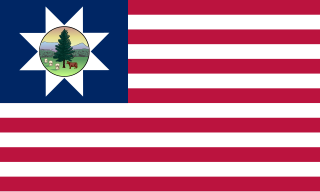
The 3rd Vermont Infantry Regiment was a three-years infantry regiment in the Union Army during the American Civil War. It served in the eastern theater, predominantly in the VI Corps, Army of the Potomac, from July 1861 to July 1865. It was a member of the Vermont Brigade.
The 11th Maine Infantry Regiment was an infantry regiment that served in the Union Army during the American Civil War.
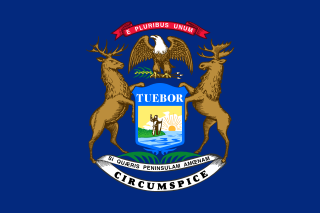
The 1st Michigan Sharpshooters Regiment was an infantry regiment that served in the Union Army's Army of the Potomac during the American Civil War.

The 9th New York Heavy Artillery Regiment, U.S. Volunteers was a regiment in the American Civil War. It was one of the nine Heavy Artillery regiments to suffer over 200 killed. It is also mentioned as one of Fox's 300 Fighting Regiments.
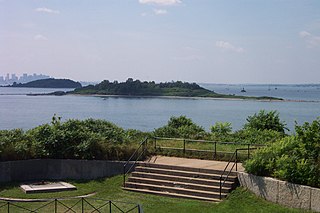
The Unattached Companies of Massachusetts Volunteer Militia were units of infantry raised for the defenses of the eastern coast of Massachusetts during the American Civil War. Twenty-six companies were mustered into the Union Army during 1864-1865, several of them reorganizing for additional terms of service.

The 4th Massachusetts Volunteer Heavy Artillery Regiment was a unit that served in the Union Army during the latter part of the American Civil War. It was formed from former Unattached Companies of Heavy Artillery raised by Massachusetts to serve the state and for the defenses of Washington, D.C.

The 1st Massachusetts Volunteer Heavy Artillery Regiment was a unit that served in the Union Army during the American Civil War. It was originally raised as the 14th Massachusetts Volunteer Infantry Regiment.
The 1st Battalion of Massachusetts Volunteer Heavy Artillery was a unit that served in the Union Army during the American Civil War. It was organized from several unattached companies of heavy artillery already raised and mustered into a three-year service for the defenses of the Massachusetts coast.
The 61st Regiment Massachusetts Volunteer Infantry was an infantry regiment raised for one year's service in the Union Army during the American Civil War from 1864 to 1865.
Battery H, 1st Rhode Island Light Artillery Regiment was an artillery battery that served in the Union Army during the American Civil War.
The 36th Arkansas Infantry Regiment (1862–1865) was a Confederate Army regiment during the American Civil War. Originally known as McRea's Emergency Regiment, had been organized as the 28th Arkansas Infantry Regiment. After the Battle of Prairie Grove, the regiment was reorganized and designated the 36th Arkansas Infantry Regiment. The regiment is also referred to as the 2nd Trans-Mississippi Infantry Regiment, Glenn's Regiment, and Davie's Regiment.

1st Connecticut Heavy Artillery Regiment was an artillery regiment that served in the Union Army during the American Civil War.
The 4th New York Heavy Artillery Regiment, U.S. Volunteers was a heavy artillery regiment that served in the Union Army during the American Civil War. The regiment operated as both heavy artillery and infantry beginning in February 1862 while serving in the defenses of Washington, D.C., and continued in both capacities until the end of the war.
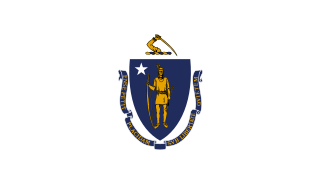
The 3rd Massachusetts Battery, was an artillery battery that served in the Union Army during the American Civil War.

The 39th Massachusetts Volunteer Infantry was an infantry regiment that served in the Union Army during the American Civil War.
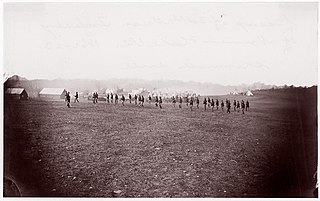
The 34th Regiment Massachusetts Volunteer Infantry was an infantry regiment that served in the Union Army during the American Civil War.
The 3rd Massachusetts Volunteer Cavalry Regiment was a cavalry regiment that served in the Union Army during the American Civil War. It was organized by consolidating the 41st Massachusetts Mounted Infantry and the 2nd Battalion Massachusetts Cavalry on June 17, 1863. The regiment served with the XIX Corps, Army of the Gulf during the Red River Campaign in 1864. Its heaviest combat during this campaign took place during the Battle of Sabine Crossroads.

The 7th Massachusetts Battery was an artillery battery that served in the Union Army during the American Civil War. The original core of the unit was a company of infantry known as the Richardson Light Guard. The company initially served provost duty at Fortress Monroe, was eventually trained in light artillery drill, and reorganized on March 17, 1862 as the 7th Massachusetts Battery.

The 11th Massachusetts Battery was an artillery battery that served in the Union Army during the American Civil War. It was formed in response to President Abraham Lincoln's August 1862 call for 300,000 men to serve for nine months. Several months after completing their first term of service, the battery was reorganized for a second term of three years. It was recruited by Captain Edward J. Jones of Boston and consisted almost entirely of men from that city. The battery served a largely uneventful first term as garrison troops mostly in Centreville, Virginia. During their second term they were involved in heavy combat being part of the Army of the Potomac during Lieutenant General Ulysses S. Grant's Overland Campaign.











